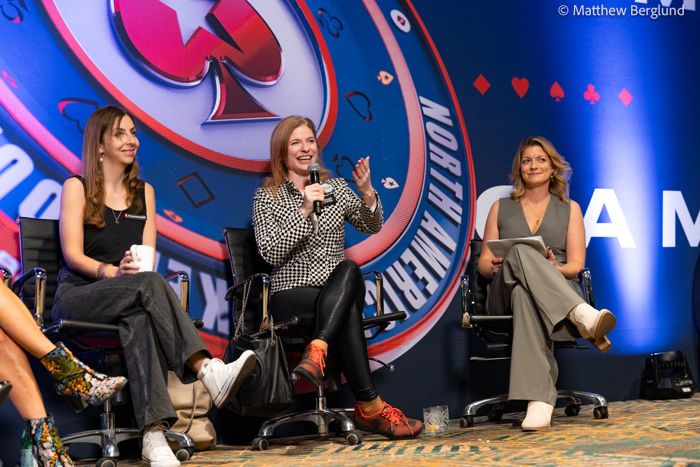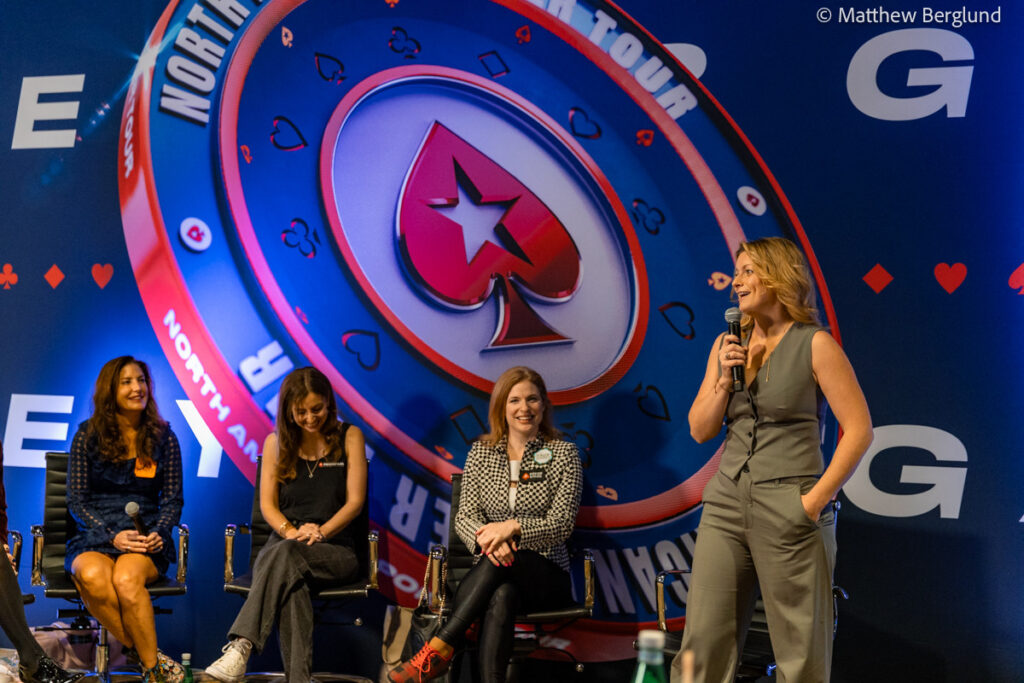
Rebecca McAdam Willetts hosted a discussion at Resorts World on North American Poker Tour (NAPT) opening day to address ways to bring more women into poker.
The PokerStars Women in Poker Panel, which included McAdam and four prominent poker playing women — Jennifer Shahade, Maria Konnikova, Alex O’Brien and Erin Lydon. For 45 minutes, the panel took an in-depth and honest look at what can be done to fix one of the game’s biggest issues.
Growing the Game

There’s no secret that, in terms of quantity, men dominate poker. At the World Series of Poker (WSOP), for example, women represent less than 8% of most fields, including the Main Event. But PokerStars, the world’s leading online poker site, is committed to doing their part in helping to increase female participation in poker.
McAdam Willetts, who is responsible for consumer relations for PokerStars, got the conversation started and introduced the panel. Before doing so, she explained a five-year plan the poker site has in place to grow the game among women, which includes a partnership with Lydon’s Poker Power women in poker organization.
Shahade, a skilled chess and poker player who represents PokerStars as one of its most prominent ambassadors, was first up to share some insight. She praised Poker Power because “they’ve created an amazing curriculum where they take people from scratch to knowing the rules of poker and feeling comfortable to sit down at a table.”
“That is so important because, like I said, a lot of women aren’t invited to the college poker game or to the boys poker game. So, sometimes the general knowledge is just lower for females and you see that a lot,” Shahade explained.
Shahade argues that teaching women the game “from scratch” will help bring more women into the game, which makes perfect sense.
The chess star addressed another issue in convincing more women to play poker, and that is money. As she explained, “women have less money and less time, and everybody struggles with loss aversion when it comes to poker tournaments.”
And that is where she opined that “playing online is crucial.” On sites such as PokerStars, there are free home games, play money games, and inexpensive tournaments and micro-stakes cash games for beginners to get their feet wet without risking much money.
Konnikova, a New York Times bestseller, discovered poker during COVID as part of a project she was working on. She had no understanding of the game at the time, but the new PokerStars ambassador, who credits her poker education to nine-time WSOP bracelet winner Erik Seidel, had a meteoric rise up the poker ranks.
“I decided I was going to learn poker from scratch,” Konnikova told the audience.
With some help from a poker legend, she learned the game from scratched and progressed so quickly and successfully that she is now a pro with nearly $500,000 in live tournament results, according to The Hendon Mob.
According to a recent PokerStars survey of 1,000 women in the United Kingdom, 72% of women do not play poker with reasons including, they don’t know how to and never having had the opportunity.
That stat is quite telling and backs up the claims made by Shahade and Konnikova. If more women were taught the game from scratch and were given more opportunities to play in affordable games, perhaps we’d see a growth in popularity.
Over half of those surveyed (55%) do not think poker is inclusive to them, with the biggest barriers to entry being lack of representation and not knowing how to play. Organizations such as Poker Power certainly help in fixing those areas.
O’Brien, whose book The Truth Detective was recently released, brought up the idea of introducing the game to women at a younger age. She’s been teaching her daughter how to play poker.



